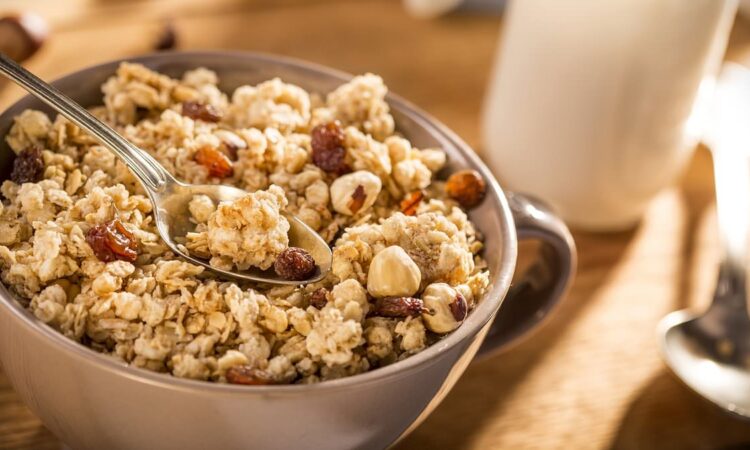
Granola may appear to be a wholesome breakfast food, but its health benefits are disputed. The main ingredients are oats, nuts, seeds and dried fruit, but some varieties contain lots of sugar.
Yet while granola may not be the best way to start your day, Goldman Sachs, the US investment bank, argues that a different type of ‘Granolas’ could provide the nutrition that your portfolio needs.
With just 14 days to invest this year’s Isa allowance, the advice to take a look at these 11 European firms is worth considering. The Granolas are GlaxoSmithKline, Roche, ASML, Nestle, Novartis, Novo Nordisk, L’Oreal, LVMH, AstraZeneca, SAP and Sanofi.
As has been pointed out, this actually spells out Grannn(o)llass.
But Goldman’s analysts are unabashed, arguing that these names are all ‘internationally-exposed quality growth compounders’.
Indeed, they are the equivalent of the US market’s all-conquering Magnificent Seven tech stocks: Alphabet, Amazon, Apple, Meta, Microsoft, Nvidia and Tesla.
Unlike the Magnificent Seven, the Granolas provide exposure not only to tech, but also to a broad range of other sectors such as beauty, food, luxury, pharmaceuticals and software.
Dutch group ASML manufactures AI microchip machinery. The Danish firm Novo Nordisk makes the weight-loss drugs Wegovy and Ozempic, taken by Elon Musk, Oprah Winfrey and at least 9m others. French giant L’Oreal owns brands such as Lancome and Essie nail polish, available in such shades as Mrs Always Right (deep pink).
Goldman’s focus on the undervalued opportunities in Continental Europe and the UK has sparked a fashion for these stocks, driving the Stoxx 600 index to record highs this year.
Not to be outdone, that other Wall Street name Citi has named its ‘Super Seven’: Novo Nordisk, ASML, LVMH, SAP, Schneider Electric, Richemont and Ferrari. Meanwhile SocGen, a French institution has listed its ‘Seven Wonders of Europe’: Novo Nordisk, ASML, LVMH, SAP, Siemens, Schneider Electric and Hermes.
Related Articles
HOW THIS IS MONEY CAN HELP
Like LVMH, this iconic handbag house is seen as less vulnerable to the headwinds facing the luxe sector.
T HIS categorisation may be gimmicky. But I would argue that it has raised the profile of best-in-class companies unjustly overshadowed by the Magnificent Seven.
This week, Nvidia may have affirmed its dominance with the launch of ‘the world’s most powerful AI chip’. Much more quietly, however, AstraZeneca continued to build on its radiology expertise through the $2.4billion acquisition of Canadian oncology biotech firm Fusion Pharmaceutical.
Goldman Sachs argues that the Granolas represent good value since the shares trade at about 20 times next year’s forecast earnings, whereas the Magnificent Seven names trade at about 30 times.
Sharon Bell from the investment bank adds: ‘While the European economy has its problems, the biggest European companies are pursuing growth all over the world.
She also argues that these shares should also be boosted by the ‘structural shift towards passive investments’. More money is flowing into ‘passive’ or index funds in a trend that tends to benefit the biggest companies. Some passive strategies also favour shares that are prospering on the basis that success breeds success.
Among those already persuaded of the Goldman thesis is Sam Morse, manager of the Fidelity European Fund and Fidelity European Trust, which hold ASML, L’Oreal, LVMH, Nestle, Novo Nordisk, the German software giant SAP and Sanofi, the French pharmaceuticals group,
Morse says: ‘These companies derive only about 20 per cent of their revenues from Europe. About 40 per cent comes from the US and another 40 per cent from the rest of the world.
‘But they have many of the attributes we look for in stocks such as cash generation, earnings stability and strong balance sheets. They also have consistent dividend growth and pricing power thanks to their strong competitive positions.’
‘We are being careful to ensure that the risk-reward associated with each holding remains appropriate as the share prices have gone up.’ He added: ‘That said, most of the valuation metrics are not overly stretched at present and we still see upside – hence our positioning in these names.’
With 15 days to go until the start of the new tax year, I am planning next year’s Isa. Already I have stakes in some European index funds and the Janus Henderson European Mid and Large cap fund, but I intend to add to these.
Paul Angell, head of investment research at broker AJ Bell, cites BlackRock Continental European Income, which holds Novo Nordisk and other Granolas. Interactive Investor’s adventurous European pick is Fidelity European.
Attention will be turning even more to the Granolas in coming months. Investors will wish to continue the Magnificent Seven thrill ride. FOMO (fear of missing out) is a feature of this Isa season. But they will also want the security of diversification into Europe – on the basis that a portfolio, like a healthy breakfast, ought to be well-balanced.
Some links in this article may be affiliate links. If you click on them we may earn a small commission. That helps us fund This Is Money, and keep it free to use. We do not write articles to promote products. We do not allow any commercial relationship to affect our editorial independence.






